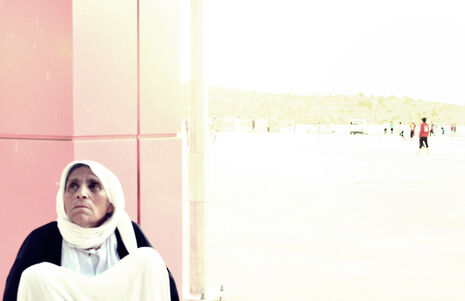Sky Holmes in Kurdistan: The realpolitik of the rock
Sky Holmes reports from Southeast Anatolia/Kurdistan. In a series of reports for Varsity, he documents his experiences in the unstable region.

Her pupils are like flint arrowheads. She is incredible. Alongside the Kurdish language teachers who are on hunger-strike here in Mardin city, this woman fights for the Kurdish cause. It does not matter that she is not Kurdish; she defends the Kurdish minority who form around 15 to 20 per cent of Turkey’s population. The PKK (the Kurdish Worker’s Party) have taken it upon themselves to defend the minority Yazidis, who have suffered genocide at the hands of the Islamic State (IS, formerly ISIS).
She speaks beautifully, like a revolutionary. Her husband is in exile in Europe; he has a sentence of seven years stacked up against him for joining a few protests and writing words that the government did not want to read. As the mainstream media reports it, the fight of the Kurds ended in 2013 along with their persecution. But in real life, the poor, angry Kurdish children are still here on the streets. I speak with these children who throw stones at the police and they tell me of an armed struggle – the same armed struggle their parents fought against the men who still cruise in gendarmerie vehicles and dominate the streets of Mardin and Diyarbakir, the symbolic Kurdish capital. The children throw stones at the armed Turkish military and police, angry at the consistent persecution, arrests and not so long ago, rapes. They feebly fight against a state that still conducts the same sort of social engineering and feels the same pride in its authoritarianism as it did in the 90s. Only recently, a Kurdish man was killed by Turkish authorities as he protested against the removal of a newly erected PKK statue. Turkish army bases continue to be built in a ‘peaceful’ Kurdistan. Still, the Kurdish children clutch their rocks tightly, for here the rock is the realpolitik of the kids.
Rocks lead to mountains and "to go to the mountains" is south-east Anatolian talk for joining the PKK. The PKK have largely relocated to Iraq to fight IS. Istanbul is not so settled as when I left, blighted by anti-Erdogan protests and PKK-affiliates assassinations of Islamic State operatives in the city. The PKK are positioning themselves against IS (once supported by the Turkish government) and, in doing so, they are gaining the support of the Kurdish youths as well as a host of Yazidis who owe the PKK their lives. The Kurdish revolutionary states that “if the left and the minorities of Turkey, those who occupy Turkey, join together, something could really change”, and perhaps, it will.
The government talks of peace as the Kurdish kids talk of war. President Erdogan promotes the ‘Turkish model’ and condemns Israel’s treatment of the Palestinians, kissing the hands of Palestinian youths in front of the cameras whilst Turkey’s own ostracised youth struggle to be heard. Their hands, un-kissed, hold stones.
Peace is desired by most of the PKK. But, in Erdogan’s police state, we must ask what peace is and whether it would look like another form of oppression. The PKK have long been a strong, dedicated force in confronting the Islamic State, and their actions have garnered huge international admiration. Their fight to protect minorities is far from over. Known for their kamikaze tactics, I do not believe that the PKK will stop opposing the sort of government and state that Erdogan currently heads.
I watch her, as I sit on the roof of the Kurdish house I have spent a short while in, teaching English to the family and sleeping on their roof. We eat figs and melons to the sound of the mosque and I watch the shepherds disappear with the setting sun. I thought that her pupils were like flint arrowheads. But now I think they are like stones, like little round rocks. In them, I see mountains and I see myself heading towards them.
 News / SU reluctantly registers controversial women’s soc18 December 2025
News / SU reluctantly registers controversial women’s soc18 December 2025 Features / Should I stay or should I go? Cambridge students and alumni reflect on how their memories stay with them15 December 2025
Features / Should I stay or should I go? Cambridge students and alumni reflect on how their memories stay with them15 December 2025 News / Dons warn PM about Vet School closure16 December 2025
News / Dons warn PM about Vet School closure16 December 2025 News / Cambridge study finds students learn better with notes than AI13 December 2025
News / Cambridge study finds students learn better with notes than AI13 December 2025 News / Uni registers controversial new women’s society28 November 2025
News / Uni registers controversial new women’s society28 November 2025









